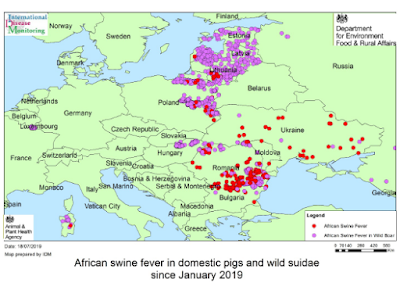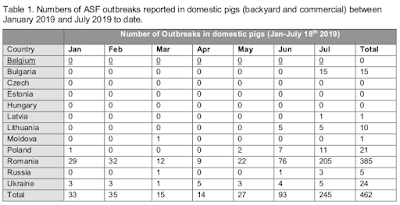#14,199
While the arrival of African Swine Fever in China last summer - and its subsequent spread across Southeast Asia - has been the big ASF story of late, the virus appeared in the Republic of Georgia in 2007 (see African Swine Fever Virus Isolate, Georgia, 2007), possibly brought in by ASFV contaminated feed products.
Within 6 months of its arrival, the virus was detected in the Russian Federation (cite), and by 2014 had been detected in 4 EU countries.Over the past couple of years we've seen the ASF virus increase its rate of spread across Eastern Europe and much of Russia.
Last September the virus was found in wild boar in Belgium - signifying a westward jump of more than 500 km (see OIE Notification: African Swine Fever Jumps To Belgium) - raising the stakes for all of western Europe.While ASF doesn't pose a direct threat to human health, its continued spread in Asia and Eastern Europe poses an existential threat to their pork industry, as the virus is often 100% fatal in pigs, and no vaccine is currently available.
Below we have the UK's latest DEFRA (Department for Environment, Food and Rural Affairs) update on ASF activity in Eastern Europe. After reporting a slowdown in cases earlier this spring, DEFRA now reports a substantial jump in detections which began in June.
I've only included some excerpts from the full report, so follow the link to read it in its entirety.
Updated Outbreak Assessment #02
African Swine fever in Europe (Eastern Europe & Belgium)
18 July 2019
Ref: VITT/1200 ASF in Europe (Eastern Europe & Belgium)
Disease report
Since our last report on the 25 th June 2019, there have been new outbreaks of ASF in domestic pigs in Eastern Europe, and further cases in wild boar in both Eastern Europe and Belgium.
The numbers of outbreaks in domestic pigs (backyard and commercial) since January 2019 are summarised in Table 1 for each affected country.
Generally, there has continued to be low number of outbreaks reported in domestic pigs since January 2019, though there have been notable increases observed in Romania (205) and Bulgaria (15). Other reports in July to date are restricted to Poland (11), Lithuania (5), Latvia (1), Russia (3) and Ukraine (5). The largest number of outbreaks in domestic pigs each month continues to be in Romania, mainly in backyard pig small-holdings, though since our last report on the 25 th of June, there have been an additional 281 outbreaks in small commercial holdings.
The number of cases in wild boar continues to be high in Poland, with 114 cases in June and 65 in July so far, while cases in Hungary appear to be continuing a downward trend (Table 2). Generally, the number of reported cases in wild boar in Eastern Europe has been decreasing through 2019, though further monitoring is required to confirm if this indicates a trend or is simply due to seasonality, as this does not match the recent increase observed in outbreaks in domestic pigs.
There have been no new large geographical jumps so far in 2019, and increased numbers of ASF-positive domestic pigs may be related to local spread or increased surveillance activities. The last significant jump of ASF within Europe was the emergence of ASF in Belgium in September 2018, where there have been 825 cases of ASF in wild boar (reports of ASF in wild boar to 16/07/2019 (Wallonie, 2019).
In June 2019, as part of their routine activities, port authorities in Northern Ireland seized a total of 300 kg of meat and dairy products illegally brought into NI by passengers during the month. A sample of one of these seizures; a sausage originating from Asia, was tested at the Agri-Food and Biosciences Institute (AFBI), resulting in the detection of ASF virus DNA fragments.
Though the presence of ASF DNA does not necessarily mean that the meat was infectious, it further underlines the potential risk to the UK from pork and pork products being brought illegally into the country by international air passengers.(SNIP)
Situation assessment(Continue . . . )
Eastern Europe is continuing to report outbreaks of ASF in domestic pigs, although this appears to be restricted to the south-east countries in the region; namely Ukraine, and Romania, with a small number of outbreaks reported in Bulgaria, Lithuania, Latvia, Poland and Russia. However, while control efforts may be reducing incidence in domestic pigs (with the exception of Romania and Bulgaria), the wild boar population represents a significant reservoir in Eastern Europe which may hinder eradication, and serve as a source for further geographic jumps, along with the potential for arthropod vectors of disease to contribute.
Conclusion
There has been an increase in the number of outbreaks reported in domestic pigs in Eastern Europe in June compared to recent months, indicating that the disease is still present across much of the region, with large numbers of cases in wild boar continuing. Given the ongoing situation in Eastern Europe, continued reports of ASF in wild boar in Belgium, as well as the ongoing disease situation in South East Asia, the risk therefore remains at medium for the entry of contaminated or infected products into UK.
The risk of exposure to the pig population in the UK is still highly dependent on the level of biosecurity on individual pig premises but is still considered to be low, although the situation is being kept under review.

